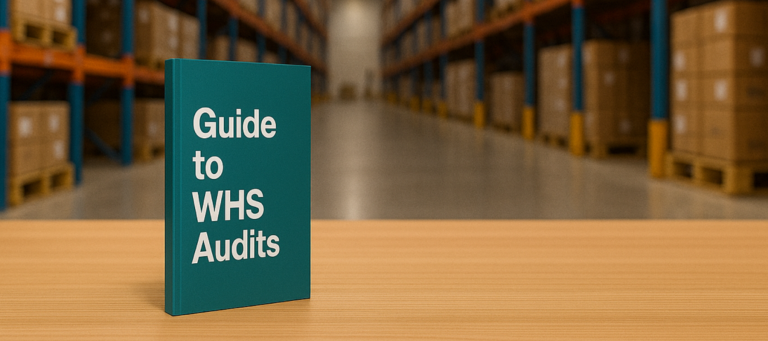A summary of the latest WHS news and updates from across Australia
1Sources: OHS Alert; National, State and Territory Regulatory websites.
National Safe Work Month
October 2023 marked National Safe Work Month, led by Safe Work Australia and promoted by regulators across Australia. As such, held every October, National Safe Work Month seeks to promote and raise awareness. Let’s reflect of the importance of work health and safety and the prevention of work-related fatalities, injuries, and illnesses.
A number of resources were available and published throughout the month, centred on the following four themes:
- Week 1: Working together to manage risks at work
- Week 2: Working together to protect workers’ mental health
- Week 3: Working together to support all workers
- Week 4: Working together to ensure a safe and healthy workplace
Learn more here – National Safe Work Month 2023 | Safe Work Australia .
Codes and legislation
Safe Work Australia
Amendments to the model WHS laws
The national model WHS laws have been amended to significantly increase the maximum available fines and jail times, and to clarify the operation of the category-1 offence in a way that is likely to give regulators and prosecutors more confidence to pursue company officers for recklessness or gross negligence. However, the amendments do not automatically apply in a jurisdiction. For the model WHS Act and model WHS Regulations to have effect in a jurisdiction, they must be enacted in that jurisdiction. Learn more here: Amendments to the model WHS laws | Safe Work Australia
Information-gathering powers added to Safe Work Australia Act 2008
The Commonwealth Safe Work Australia Act 2008 has been updated to incorporate Safe Work Australia’s new powers to obtain information from WHS regulators and other persons. The powers allow SWA’s CEO to apply to a person for information that is relevant to the performance of SWA’s functions of collecting data and undertaking research that informs the development and evaluation of WHS and workers’ comp policies and strategies, if the CEO reasonably believes the person has such information.
Working from home WHS Guidance
Safe Work Australia published new resources on managing WHS risks when workers are doing computer-based work from home. The resources include information sheets for PCBUs and workers, a checklist to help identify common hazards which may be present when working from home, and a workstation set up infographic. Download the resources for practical information on meeting your WHS duties when working from home here – Working from home – Resources | Safe Work Australia
Consultation Checklist
Safe Work Australia has published an updated WHS consultation checklist to comprehensively reflect WHS duties and better support duty holders’ understanding of the requirements. In addition, if you’re a PCBU, you must consult with workers (and any health and safety representatives) and other duty holders to manage WHS risks. This checklist is intended to help you to ensure you have arrangements in place that support effective consultation.
The checklist is available: Consultation checklist | Safe Work Australia and included in the Model Code of Practice: Work health and safety consultation, cooperation and coordination.
Asbestos registers at the workplace – new guide now published
Where buildings, structures or plant equipment at your workplace built or installed before 2004, or if in Queensland before 1990. The person with management or control of the workplace, for example the owner, must ensure an asbestos register is prepared, maintained and readily accessible to other persons at your workplace. The guide seeks to assist you:
- understand what an asbestos register is and if your workplace needs one;
- develop and maintain a comprehensive asbestos register that identifies asbestos at your workplace; and
- understand who are considered “competent persons” in relation to identifying asbestos and collecting information for asbestos registers.
A copy of the guide is available here: Asbestos registers at the workplace.
Safe Work Australia – New Interactive Data Website
Safe Work Australia released a new interactive data website allowing users to explore national WHS and workers’ compensation data in an intuitive and user-friendly way. The new website provides a wide array of WHS data through dashboards, data collections and reports not previously available to the public. Website users can now explore and create their own charts and tables to explore insights into WHS data by industry, occupation, year, and mechanism of injury. Explore Safe Work Australia Data at Our Data. Your Stories. | dataswa (safeworkaustralia.gov.au).
New South Wales
New WHS Laws bring tougher penalties in NSW
The NSW Government has introduced WHS amendments:
- tripling the maximum penalties for category-1 breaches,
- clarifying that officers can be prosecuted for recklessness,
- introducing “prohibited asbestos notices” with hefty non-compliance fines,
- giving police certain enforcement powers under WHS laws.
SafeWork NSW Respect at Work Strategy: preventing sexual harassment
SafeWork NSW has launched its first four-year Strategy (2023-2027) to support NSW businesses in preventing workplace sexual harassment and other gender-based harmful workplace behaviours. Through the Strategy, SafeWork NSW will educate NSW businesses on their duties to prevent and respond to workplace sexual harassment before it occurs and take appropriate enforcement action to protect NSW workers. Learn more via: SafeWork NSW releases strategy to help prevent sexual harassment at work | SafeWork NSW
SafeWork NSW new SeasonalSAFE tool
NSW Government is rolling out a new easy-to-use online, interactive SeasonalSAFE planning tool. The SeasonalSAFE Plan seeks to helps businesses prepare and manage the risks summer weather can pose to their workers and patrons. All businesses are urged to complete a SeasonalSAFE Plan. Including businesses in Sydney’s CBD where bushfire related dangers can often be neglected. While the flames themselves may not be a threat to these businesses, smoke from these fires can often travel thousands of kilometres, polluting the lungs of those in the city. The SeasonalSAFE Plan form can be accessed on the SeasonalSAFE page.
Victoria
New national dangerous goods Code taking effect in Vic.
The latest version of the Australian Code for the Transport of Dangerous Goods by Road and Rail, Edition 7.8, will come into force in Victoria on 1 October 2023, under changes made to the State’s dangerous goods legislation. Through transitional arrangements, duty holders can elect to continue complying with the previous version until 1 April 2024. The National Transport Commission, which administers the Code, intended that it be used from 1 April 2023, and mandatory from April next year, but acknowledged that some states would apply different commencement dates. Lear more via: Australian Dangerous Goods Code | National Transport Commission (ntc.gov.au) .
Tougher spotter and guarding rules made for EWPs
WorkSafe Victoria has alerted duty holders to recent changes to its “Industry Standard for the safe use of elevating work platforms” (EWPs), which includes additional guidance on emergency procedures and the requirements for a safety observer during operation. Elevating Work Platforms industry standard – Key changes | WorkSafe Victoria
Lithium-ion battery fires
WorkSafe Victoria have issued a reminder about the risks of using, storing and charging equipment that has lithium-ion batteries. Lithium-ion batteries are found in many products. These products may be used, stored or charged in a workplace or an area under the management and control of an organisation. When overheated, lithium-ion batteries of all sizes can catch fire. The fire is often hard to put out and the smoke from the fire can be toxic. There was a tragic fatality recently where a person was quickly overcome by the fumes of a lithium battery fire.
There are a number of recommended ways to control risks associate with lithium-ion batteries overheating and catching fire. Access the latest WorkSafe Victoria safety alert via Lithium-ion battery fires | WorkSafe Victoria to learn more, including your legal duties under the Occupational Health and Safety Act 2004.
Consider if there are old batteries that can be disposed to reduce the risk of fires in your workplace and remember batteries should never be placed in general waste.
See link for safe battery recycling https://recyclingnearyou.com.au/batteries/
South Australia
Engineered stone regulations now in effect
Strict new regulations on the processing of engineered stone products came into effect from 1 September 2023 in a bid to reduce the risk of dust diseases and bring SA in line with other Regulators. All workers involved in cutting, grinding, trimming, sanding, or drilling engineered stone products must be provided with respiratory protective equipment, and use a dust control system such as a water suppressant or exhaust ventilation.
Under the regulations, it is an offence for an employer or contractor to direct or allow a worker to process engineered stone without specific control measures in place to minimise the risk of silica dust inhalation.
The regulations carry penalties of up to $6,000 for an individual or $30,000 for a body corporate, in addition to existing criminal offences under the WHS Act which provide for up to 5 years imprisonment and fines of up to $3 million for reckless conduct which exposes a person to the risk of death or serious injury or illness.
SafeWork SA will enforce the new regulations, which will bring SA in line with recent changes by Safe Work Australia to the model work health and safety laws. Learn more here: Engineered stone regulations kick in | SafeWork SA
New regulations to manage risks of psychological harm
New regulations under the Work Health and Safety Act 2012 will help provide better guidance to workers and employers on how to manage the risk of psychological injuries and illnesses in the workplace.
Psychological illnesses have a significant effect on workers’ health, as well as business productivity. There has been a growing recognition of the need for the WHS framework to better deal with risks of psychological harm.
The new regulations reflect the outcomes of an independent review of Australia’s model WHS laws in 2018, which recommended more specific guidance how to identify and manage psychosocial risks.
Psychosocial hazards are hazards that may cause psychological harm. Examples range from excessive workload demands, to exposure to traumatic events and material, to issues such as bullying, harassment and sexual discrimination in the workplace.
The new regulations will come into effect in December 2023. When the regulations come into effect they will be supported by a Code of Practice on Managing psychosocial hazards at work which will provide practical guidance on how to manage risks to psychological health, developed in consultation with workers and businesses. Learn more here: New regulations to manage risks of psychological harm | SafeWork SA
Queensland
Amusement Devices Code of Practice 2023
Amusement Devices Code of Practice 2023 commences 1 February 2024. The 92-page Code includes practical guidance on how to manage health and safety risks associated with amusement devices at a workplace.
In late 2018, the State Government drafted new WHS Regulations for amusement devices and flagged developing the Code to support the new provisions. The new provisions were prompted by the October 2016 deaths of four patrons on a ride at the Dreamworld theme park.
The Code has been developed in Queensland and is not a national model code of practice. However, guidance material about amusement devices developed by Safe Work Australia has been adapted and included in the Code.
The Code complements requirements in the WHS Act and WHS Regulation regarding plant and amusement devices at workplaces. The Code also replaces the WHSQ publication Amusement device major inspections interim guidance. To learn more visit:
Australian Capital Territory
WHS Consultation, Cooperation and Coordination Code of Practice amendments
The ACT Government has reviewed its WHS Code of Practice, Work Health and Safety Consultation, Cooperation and Coordination, to align with recent amendments made to the national model version of the Code. Commencing 23 October 2023, the revised amendment includes a more comprehensive consultation checklist; and clarifies that the duty to consult workers on WHS risks “can occur in different ways depending on what suits the workplace” and the workers, and be conducted through health and safety representatives, health and safety committees, team meetings, toolbox talks, staff meetings, or discussions with individuals or small groups. A copy of the revised code is available: Work Health and Safety (Work Health and Safety Consultation, Cooperation and Coordination Code of Practice) Approval 2023 | Notifiable instruments
WHS Sex Work Code of Practice
ACT has developed the WHS Code of Practice, Sex Work, which “provides practical guidance to PCBUs and sex workers on how to manage health and safety risks associated with sexual services in their workplace”.
Unique to the Capital Territory, the Code will take effect on 4 February 2024 and replace the “Sexual Services Industry” safety Code, which was made under the ACT’s old Work Safety Act 2008 and retained after the ACT transitioned to the harmonised WHS regime at the start of 2012.
The new Code “aims to foster a culture of safe work practices and promote the welfare and occupational safety of sex workers in the Territory”. “It is recognised that sex workers can be exposed to hazards in the workplace that other workers may not be exposed to, so this Code aims to provide practical guidance on how to control these identified hazards and promote a safe environment for both sex workers and clients.” it says.
Access a copy of the approved code: Work Health and Safety (Sex Work Code of Practice). Approval 2023. Notifiable instruments
NEW Codes of Practice coming into effect in November
The ACT Government has notified two new Codes of Practice:
- Managing the Risks of Airborne Crystalline Silica (Silica Dust) in the Workplace Code of Practice; and
- Managing Psychosocial Hazards at Work Code of Practice.
The Code of Practice for managing the risks of silica dust commences on 15 November 2023 and supports the WHS regulations introduced in 2022. It aims to provide better protection to ACT workers who modify engineered stone and other materials containing silica.
The Code of Practice for managing psychosocial hazards commences on 27 November 2023 and supports the new regulations for psychosocial hazards introduced in the WHS Amendment Regulation 2023. Furthermore, this Code aims to provide more information to duty holders about what psychosocial hazards are, how to prevent harm, and what control measures can be used in workplaces. Click here to learn more: NEW Codes of Practice coming into effect in November – WorkSafe ACT
Reminder: Workplace Sexual Assault is now a notifiable incident
Under the ACT Work Health and Safety Act 2011, workplace sexual assault is a notifiable incident. This means that as soon as becoming aware of an incident of suspected or actual sexual assault that occurs in their workplace, PCBUs have a duty to notify WorkSafe ACT.
If the notifiable incident is a result of more than one business or undertaking, then all businesses must notify WorkSafe ACT.
Everyone has a right to a safe and healthy workplace and PCBUs are required to fulfil all of their obligations relating to notifiable incidents. Visit WorkSafeACT website to learn more: Reminder: Workplace Sexual Assault is now a notifiable incident – WorkSafe ACT
Northern Territory
New and varied Codes of Practice published
A new Code of Practice has been approved in the Northern Territory under the Work Health and Safety (National Uniform Legislation) Act 2011.
The Tower Cranes Code of Practice provides practical guidance on managing the risks of working with tower cranes. In addition, the following 11 Codes of Practice have been varied to reflect technical updates made at the national level and improve duty holders’ understanding of their WHS duties:
- Abrasive blasting
- Confined spaces
- How to manage and control asbestos in the workplace
- How to safely remove asbestos
- Labelling of workplace hazardous chemicals
- Managing noise and preventing hearing loss at work
- Managing risks of hazardous chemicals in the workplace
- Preparation of safety data sheets for hazardous chemical’s
- Spray painting and power coating
- Welding processes
- Work health and safety consultation, cooperation and coordination
Visit NT WorkSafe to learn more: https://worksafe.nt.gov.au/forms-and-resources/news-and-events/news/2023/new-and-varied-codes-of-practice-published.
Installation requirements for RCD’s after 1 May 2023
The Electrical Regulatory Authorities Council (ERAC) has issued an advisory note regarding the use of ‘Type AC’ Residual Current Devices (RCD’s). ‘Type AC’ RCDs must not be installed in the following circumstances:
- New electrical installations as required by AS/NZS 3000
- New final sub-circuits
- Alterations or additions to an existing final sub-circuit that requires an RCD to now be installed.
- Existing equipment containing RCDs that are connected by fixed or “hard” wiring and energised for the first time at a new location; including
- building and construction sites;
- demolition sites;
- shows, carnivals and similar events; and
- transportable structures.
For more information, Download the ERAC Advisory note – Type AC RCD or visit NT WorkSafe at: https://worksafe.nt.gov.au/forms-and-resources/news-and-events/technical-updates/2023/installation-requirements-for-rcds-after-1-may-2023
Western Australia
Regulation amendments come into effect
The Work Health and Safety Regulations Amendment Regulation (no.2) 2023 came into effect on 10 August 2023 and provides for minor corrections and technical refinements. Amendments include removing the requirement to have a high-risk work licence for earthmoving machinery used as a crane where the machinery has a safe rated working load of three tonnes or less and creating a new licensing regime for larger earthmoving machinery used as a crane.
Amendments to Work Health and Safety (Mining) Regulations were also made. Visit the Department of Mines, Industry Regulation and Safety to learn more at:
Tasmania
For the latest update from WorkSafe Tasmania, check out their edition.
Work Health and Safety Amendment Bill 2023
An amendment to the Tasmanian WHS Act is currently sitting with parliament. Notably, the proposed changes bring the Tasmanian Act in line with other Regulators by introducing Gross Negligence, adjustments to consultation arrangements, powers for Inspectors, and clarification of privilege against self-incrimination. Learn more by visiting:
- https://www.parliament.tas.gov.au/__data/assets/pdf_file/0030/72489/18_of_2023.pdf
- https://www.parliament.tas.gov.au/bills/2023/work-health-safety-amendment-bill-2023-18-of-2023
Comcare
September 2023 – Latest changes to WHS laws
Changes to Commonwealth Work Health and Safety Act 2011, passed in March 2023 came into effect on 21 September 2023. Specifically, they include prohibiting insurance against WHS penalties; adding negligence as a fault element to the category-1 reckless conduct offence; allowing HSRs to choose their own Comcare-approved training courses; enhancing Comcare’s powers around acquiring and sharing information; and extending the deadline for a person to make a request for Comcare to bring a category 1 or 2 prosecution from 12 to 18 months.
This follows changes to the Work Health and Safety Regulations 2011 in April 2023 which prescribe how employers must identify and manage hazards and risks to workers’ psychological health and safety.
Learn more here: WHS laws are changing | Comcare
Standards Australia
We work with workplaces to improve facilities and traffic management, and thus, we found this change and opportunity for public comment interesting.
A proposal to increase the size of parking bays across Australia could accommodate the trend of larger vehicles on Australian roads. The revision to standard AS/NZS 2890.1:2004. Parking Facilities. Part 1: Off-street car parking, recommends an increase in the length of off-street car parking spaces from 5.4 m to 5.6 m.
Standards Australia advised: “The last revision to the standard happened 18 years ago. The experts that we work with to put that in place looked at the average car that we drove back in 2004. We have changed our national fleet significantly over the last quarter. Back in 2004 when we last reviewed the standard, about 13% of our national vehicle fleet was an SUV. It’s now about 40%. As our cars have changed, we also need to consider our car parks.”
State and local authorities may have their own requirements in town and area planning regulations and Development Control Plans. However, courts normally consider Australian Standards as prevailing documents. The proposed changes to the standard AS/NZS 2890.1:2004. Parking Facilities. Part 1: Off-street car parking are open for public comment until November 9, 2023, at https://comment.standards.org.au/. The revised standard is expected to be finalised in approximately six months.
Visit: Revised standard recommends larger parking bays across the country – Standards Australia
Standards Australia continues to focus on community safety during warmer months
September marked National Fire Protection Month. A timely reminder for Australians to be aware of fire prevention and safety measures.
In recognition of Standards Australia work to shape fire safety practices, the following new standards have been introduced to supplement and hence improve existing home fire safety standards.
- AS 1670.6:2023, Fire detection, control, warning, and intercom systems, system design, installation, and commissioning Part 6: smoke alarm systems. The updated standard streamlines the design, installation, and commissioning of smoke alarm systems for diverse residential properties.
- AS/NZS 5601.1, Gas installations, Part 1: General installations. Published in 2022. The revised standard has significant changes designed to mitigate property damage and house fires linked to multilayer gas pipes.
- AS/NZS 3000:2018, Electrical Installations. Also known as, the ‘Wiring Rules’, provides the technical rules that help electricians design and construct electrical installations.
- AS 5113:2016, Classification of external walls of buildings based on reaction to fire performance. Outlines passive fire protection systems that prevent flame spread, and includes guidance and testing methods for building materials, smoke doors and ventilation systems.






